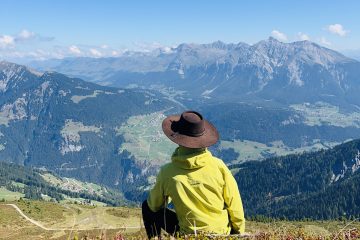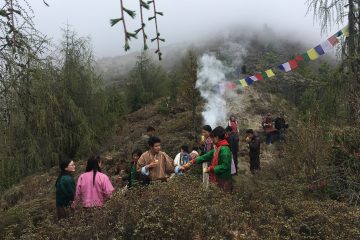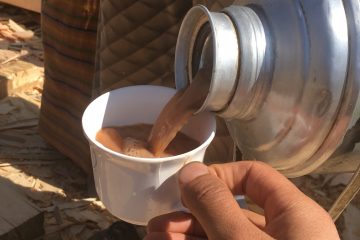Wintry Phobjikha, dusty and barren, is a charmless place for the most part. One must admit it has its own idiosyncratic appeals, though. For instance, the tourists love to flock there to to see the endangered black-necked cranes.
No wonder. The fun-loving 6th Dalai Lama of crazy wisdom fame, apparently lamenting the chaste life he had to lead at the holy Gandhen Phodrang surrounded by even more chaste lamas, is said to have sung a touching tribute to the elegant birds. The ditty, still sung to this day in the Tibetosphere, goes something like:
White crane, lovely bird, Lend me your wings
I’m not going far and away, I’ll return through the plains of Lithang.
Today, these heavenly birds are said to circumambulate the old Gangtey Monastery three times before flying out to the Tibetan and Qinghai Plateaus in the spring. One asks: Riding a thermal draft? Perhaps. Worshipping the lama on the hill? More likely.
And then there is the wide dale itself – a welcome respite from the rough and tumble landscape of the Bhutanese Himalayas. To be sure, everything rural, albeit a bit dusty and stony all around in winter, carries with it a rustic appeal not unbeknownst to most folks.
But is that all there is to it, you think out loud.
The narrow road from the Lawala Pass all the way to the Anim Dratshang is an asphalted zig zag carved assiduous into the gently undulating hill-scape on the dale’s outskirts. Patchy with potholes in some bends, the road is better as a cycling route than a road for campers and land cruisers that ply along on the lonely lane. But mid-stretch where it cuts right through the center of the valley, the speed-crazed motorist can reach a heady 70kmph.
And where the fragrant Bhutanese blue pines dominate, such as along the Gantey Gonpa – Hendru Zampa stretch, one can take a nice crispy walk and be regaled by one’s existence in such a hardy landscape.
Where the steppe-like wind dominate, such as along the Jangoley – Nimphey stretch, one wishes simply to be by the bukhari-side, cusping a nice pint of bitter in hands, and laughing away at silly banters with equally silly, if not sillier, friends. A cup of chai can serve the purpose equally well.
But really, though, what else is there in the valley?
In the peaceable villages perched on the upper slopes where scraggy cattle roam among the brown hillsides and the winter winds funnel bluish smoke from bukharis into the cloudy afternoon corners, kids wait for their exam reports on EMIS which has been down for some days now. For good riddance (I am joking), parents anxiously hope their offsprings get into government colleges. Private schools and colleges would be unbearably expensive, they reckon. Rightly.
By the Bukhari cackling with fir logs aflame, great grandparents reminisce the grand old days when kids worked the land hard and brought back home good cash instead of playing Candy Crush on the phone by the fireside. Just as it is difficult to teach old dogs new tricks, the old guards refuse to accept the changing times. That is alright. They have their tales to tell.
Young men of the family ride their tractors into the woods, collecting firewood, and maybe felling a tree here or two there to make a few bucks on the grey market. One has got to buy fertilizers and chemicals for the fields waiting to be planted. And with the central bank’s moratorium on BDBL loans, where can one get get the cash on time? Strictly speaking, not every man is a rascal, but like rascals, we all make do with what we can.
Men, women and children empty their bamboo-baskets, filled to the brim with rich cow manure, in the fields in the cold weather, the sky pregnant with snow that is long overdue. The workers ponder what curry they will get served for lunch while hauling the heavy load over stony paths. Every once in a while, a flickering twitch around their eyes give away domestic worries. When will they get paid for potato they sold last September about which they still haven’t heard back from the dealers? Kids are about to go back to school; Uniforms and stationeries, free no more, do not rain down from the heavens even though it may rain cats and dogs in the summer. It is a shame.
At lunch time, the man of the household boldly declares he has found a defacto and is leaving for Australaya soon enough. Not Australia, for he cannot speak English. Australaya. The workers quickly ask what he will do there to make money, and he laughs, “Clean.” Others add, “Ayy, not such a bad idea. Looks at all of us here, covered in cow poo.” Word.
In the sheltered nooks of the land, balding craftsmen split bamboo and weave baskets while bony cattle lounge around, waiting for the sumptuous bamboo leaves to be discarded and chewed on. Bovine smell pervade the landscape and the conscience. Soon, one get too used to it that it actually becomes quite missable. One wonders who will weave the baskets and breathe in the cow smell once these aging weavers have seen their days. We will leave it at that.
In the more sheltered corners of the land, grandmas with staffs in hands and mani syllables on lips herd the sheep, cursing at the few stray dogs still left out in the open after the National Accelerated Dog Population Management project last year took care of most.
On the more windy slopes uphill, sprightly uncles burn juniper sprigs, sending columns of white smoke billowing into the hazy winter sky and warding off feral wild dogs the jeep-touting soldiers never managed to gun down with their polished kalashnikovs last year. Now all that remains of the gun-slinging, rum-drinking soldiers who were sent out he valley to eliminate the foxy dholes are the wild dogs, and the wild gossips of their excapades. The foxes’ escapades, or the soldiers’, one necessarily wonders. Deliberate ambiguity is warranted.
Snotty-nosed kids play in the dirt while the noisy blue tractors chug on, some carrying timber for the pocket changes, some piled high with sun-dried turnips for the cows, and still some scurrying forth with fresh, steaming manure for the parched fields.
At evening, the pregnant sky breaks water, showering the dark night landscape with large snowflakes that flitter more than gold in the stray beams of light streaming through the open windows of the farmhouses with the kettles hissing away on the bukharis in the middle. The men of the household enjoy a can of beer with an occasional worried glance from the wives and children.
The young man on his bicycle, confronting the prospect of cycling uphill for thirty minutes in the first snow of the year without gloves, takes it all in, grinning smugly as he starts to pedal forward. Someone points out he could take the car for it is snowing. By then, Misty Terrace has already started playing in the earphones; He has ears for none save his heart.
A wise person once said, “every winter has its spring.”
And so life goes on.



1 Comment
nloday · February 12, 2023 at 5:51 pm
Great post! I really enjoyed reading about the latest events back home. Your blogs reminded me about the good old days. I especially appreciated the real-life examples you provided to illustrate the events. Keep up the good work brother!